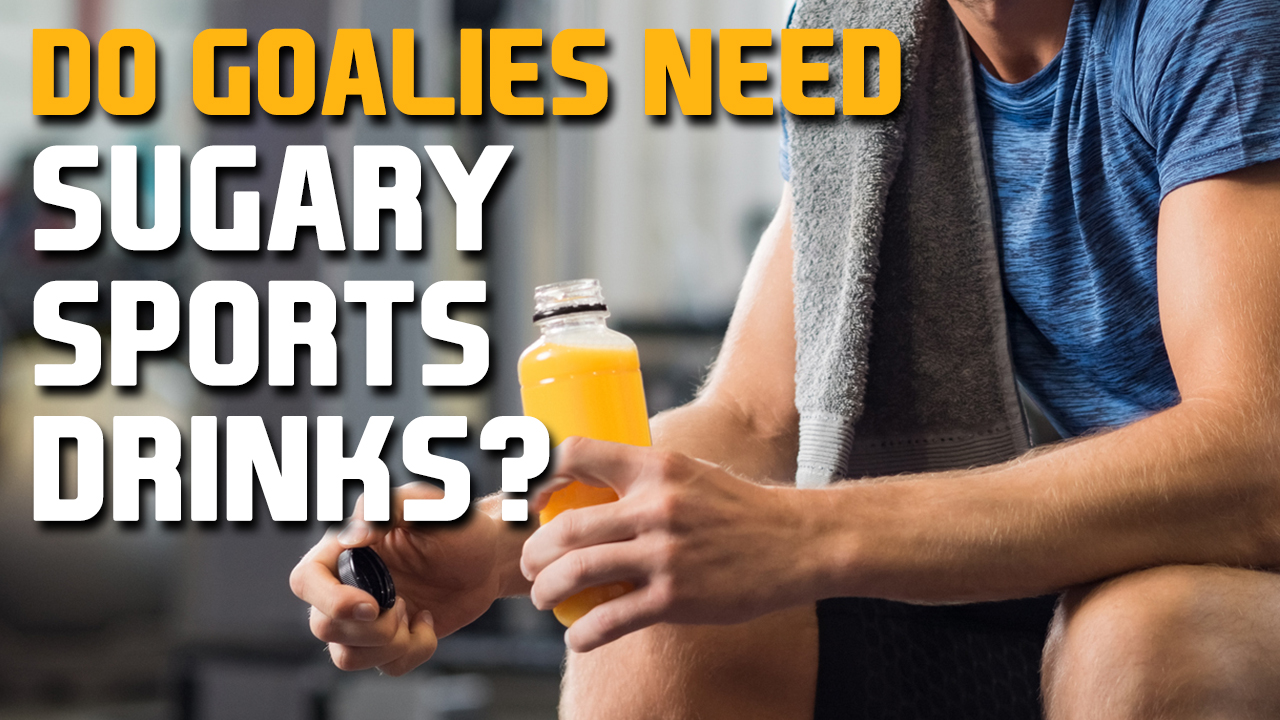For most of you, there is a big difference between how much fluid you lose and how many calories you expend during a practice compared to a game.
When I look at heart rate data from college or pro teams, the heart rate response is way different.
In a practice the goalie is working at or near threshold much of the time.
In a game, they very rarely get to that level – not that it isn’t hard and it isn’t tiring, there just isn’t the same volume of work as there is in practice. Even if you look at it mathematically; how many shots do you face in practice – – I can’t even count that high – – compared to the number of shots in a game.
So, your strategies might need to be different.
You need to drink fluid, that is not being debated here – I have written other articles on exactly how much you should be drinking and how to know if you have consumed enough, you can find a very detailed article here (you should read it) >> https://www.goalietrainingpro.com/goalies/hockey_goalie_training/have-a-drink-stop-more-pucks/
What I am talking about is a sport drink with sugars (or carbohydrates) in it vs. a drink that replaces your fluid and electrolytes without the energy.
In intermittent sports like hockey – sugar (glycogen) availability does not limit performance. You are not running out of fuel, unless you are not adequately nourished prior to the event. So getting the fluid and electrolytes is probably the more important factor.
But a research study found that although there was sufficient energy availability for events lasting 45-75 minutes, when athletes consumed small amounts or even just rinsed their mouth with a carbohydrate containing drink their performance improved.
How does that work?
Their conclusion was:
There is now robust evidence that in situations when a high-power output is required over durations of about 45–75 min, mouth rinsing or intake of very small amounts of carbohydrate play a largely non-metabolic role involving the central nervous system in enhancing performance by 2–3%
- Reference below
And they are WAY smarter than me, so I’ll buy that.
What is the bottom line?
Here are your “take homes”…
- Fluid/electrolyte replacement is the most important, especially for goalies who sweat more than their skater teammates AND don’t get the same opportunities on the ice to have a sip
- The carbs (sugars) in some sport drinks are not necessary, but can improve performance by 2-3% via a central nervous system response
- If your practice is going longer than 60-75 minutes, probably a good idea to ingest over time a sport drink with some carbs.
And you don’t have to suck on a blue coloured potion if you don’t want, you can make your own, you can find some that have less ‘stuff’ in there that you don’t want. There are lots of alternatives.
BONUS TIP:
Do not make this mistake…
You can eat a proper meal with carbs, protein and healthy fats before your game or practice, but don’t sit in the dressing room sipping on a sport drink with carbs (sugar) before you hit the ice. Water in the dressing room before the game, sport drink (with or without sugar) only once you hit the ice.
The last think you want is to trigger an insulin response and tell your cells to suck up the sugar from your bloodstream moments before you are going to need it to fuel your powerful butterfly pushes and double pad stacks ☺
If you want to learn more about the science of it, check out this review article from the Journal of Sport Science…
Carbohydrates for training and competition
Louise M. Burke ,John A. Hawley,Stephen H. S. Wong &Asker E. Jeukendrup
Pages S17-S27 | Accepted 01 May 2011, Published online: 09 Jun 2011
